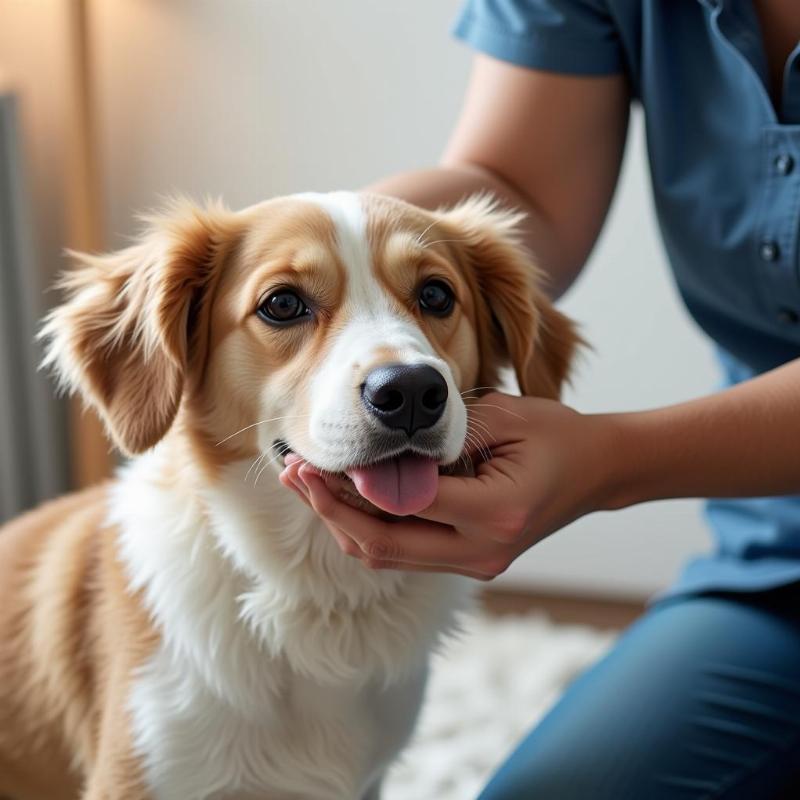Dog vaccinations are crucial for protecting our furry friends from preventable diseases. However, it’s not uncommon for dogs to experience some discomfort after receiving their shots. This can range from mild soreness to temporary lethargy. Understanding what’s considered a normal reaction to vaccines and recognizing signs that warrant veterinary attention is essential for every responsible dog owner in the US. “Dog in pain after shots” is a common concern, and we’ll cover everything you need to know to ensure your dog’s well-being post-vaccination.
Understanding Post-Vaccination Discomfort in Dogs
It’s important to remember that vaccines stimulate the immune system. This process can cause some temporary inflammation and discomfort, much like we sometimes experience after receiving our own shots. A little tenderness at the injection site, slight swelling, or even a small lump are common and usually resolve within a few days. Some dogs may also exhibit mild lethargy, a decreased appetite, or a low-grade fever. These reactions are generally considered normal and are a sign that the vaccine is working. However, more severe reactions, while less common, can occur and require immediate veterinary attention.
Signs Your Dog Needs Veterinary Attention After Vaccinations
While some discomfort is expected, certain symptoms indicate a more serious reaction that requires a vet’s intervention. If your dog experiences any of the following, contact your veterinarian immediately:
- Difficulty breathing or swelling of the face, lips, or throat: This could be a sign of an allergic reaction (anaphylaxis) and is a medical emergency.
- Persistent vomiting or diarrhea: While occasional vomiting or loose stool can be normal, persistent gastrointestinal upset warrants a check-up.
- Hives or widespread itching: These are also signs of an allergic reaction and require immediate attention.
- Collapse or seizures: These are severe reactions and require immediate emergency care.
- High fever (over 103.5°F): A low-grade fever is sometimes expected, but a high fever can indicate a more serious issue.
- Pain that persists or worsens after a few days: Mild soreness should improve gradually. If it intensifies or doesn’t subside, contact your vet.
Minimizing Discomfort After Vaccinations
There are several steps you can take to help minimize your dog’s discomfort after receiving vaccinations:
- Apply a warm compress: A warm, damp cloth applied to the injection site can help soothe soreness.
- Keep the area clean: Ensure the injection site remains clean and dry to prevent infection.
- Provide a comfortable resting place: Offer a quiet and comfortable place for your dog to rest and recover.
- Monitor your dog closely: Observe your dog for any unusual signs or symptoms and contact your vet if you have any concerns.
- Follow your vet’s instructions: Your veterinarian may recommend pain medication if necessary. Follow their instructions carefully.
What to Expect at the Vet
If you notice any concerning symptoms, your vet will likely perform a physical exam and may recommend additional tests to determine the cause of the reaction. Treatment may include medications to manage allergic reactions, pain, or inflammation.
 Home Care for Dogs After Vaccination
Home Care for Dogs After Vaccination
Conclusion
While “dog in pain after shots” is a common search query reflecting a valid concern, understanding what’s normal and what’s not is key. By being aware of potential reactions and taking proactive steps, you can ensure your dog’s comfort and well-being after their necessary vaccinations. Remember, vaccinations are vital for protecting your dog’s health. Don’t hesitate to contact your veterinarian if you have any questions or concerns.
FAQ
- Is it normal for my dog to be tired after shots? Yes, mild lethargy is a common side effect of vaccinations.
- How long does soreness at the injection site usually last? Soreness typically resolves within a few days.
- Can I give my dog pain medication after vaccinations? Only administer medications prescribed by your veterinarian.
- What should I do if my dog has a severe reaction? Contact your veterinarian or an emergency animal hospital immediately.
- When should I schedule my dog’s next vaccination appointment? Follow your veterinarian’s recommended vaccination schedule.
- Are there any alternative vaccination schedules? Discuss any concerns about vaccination schedules with your vet.
- What are the core vaccines for dogs in the US? Core vaccines include those for rabies, distemper, parvovirus, and adenovirus.
Beautdogs.us is your premier source for all things dog-related in the US. We offer expert advice on dog breeds, care, and products to ensure your canine companion lives a happy and healthy life. From puppyhood to senior years, Beautdogs.us provides reliable information for both new and experienced dog owners. Contact us today for all your dog-related inquiries. Email: [email protected], Phone: +1 501-555-7529. Visit us at Beautdogs.us.